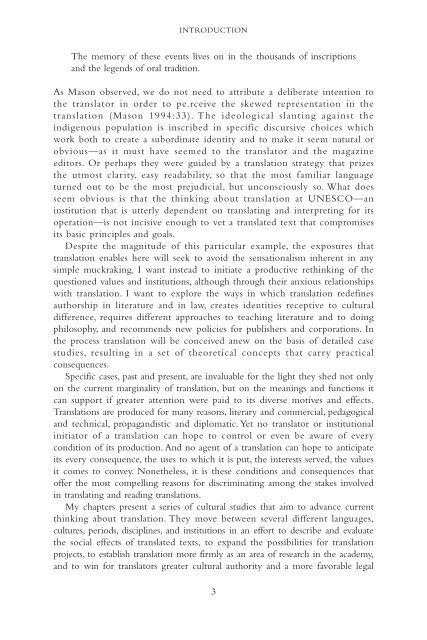THE SCANDALS OF TRANSLATION
9781134740642_sample_893345
9781134740642_sample_893345
Create successful ePaper yourself
Turn your PDF publications into a flip-book with our unique Google optimized e-Paper software.
INTRODUCTIONThe memory of these events lives on in the thousands of inscriptionsand the legends of oral tradition.As Mason observed, we do not need to attribute a deliberate intention tothe translator in order to pe.rceive the skewed representation in thetranslation (Mason 1994:33). The ideological slanting against theindigenous population is inscribed in specific discursive choices whichwork both to create a subordinate identity and to make it seem natural orobvious—as it must have seemed to the translator and the magazineeditors. Or perhaps they were guided by a translation strategy that prizesthe utmost clarity, easy readability, so that the most familiar languageturned out to be the most prejudicial, but unconsciously so. What doesseem obvious is that the thinking about translation at UNESCO—aninstitution that is utterly dependent on translating and interpreting for itsoperation—is not incisive enough to vet a translated text that compromisesits basic principles and goals.Despite the magnitude of this particular example, the exposures thattranslation enables here will seek to avoid the sensationalism inherent in anysimple muckraking. I want instead to initiate a productive rethinking of thequestioned values and institutions, although through their anxious relationshipswith translation. I want to explore the ways in which translation redefinesauthorship in literature and in law, creates identities receptive to culturaldifference, requires different approaches to teaching literature and to doingphilosophy, and recommends new policies for publishers and corporations. Inthe process translation will be conceived anew on the basis of detailed casestudies, resulting in a set of theoretical concepts that carry practicalconsequences.Specific cases, past and present, are invaluable for the light they shed not onlyon the current marginality of translation, but on the meanings and functions itcan support if greater attention were paid to its diverse motives and effects.Translations are produced for many reasons, literary and commercial, pedagogicaland technical, propagandistic and diplomatic. Yet no translator or institutionalinitiator of a translation can hope to control or even be aware of everycondition of its production. And no agent of a translation can hope to anticipateits every consequence, the uses to which it is put, the interests served, the valuesit comes to convey. Nonetheless, it is these conditions and consequences thatoffer the most compelling reasons for discriminating among the stakes involvedin translating and reading translations.My chapters present a series of cultural studies that aim to advance currentthinking about translation. They move between several different languages,cultures, periods, disciplines, and institutions in an effort to describe and evaluatethe social effects of translated texts, to expand the possibilities for translationprojects, to establish translation more firmly as an area of research in the academy,and to win for translators greater cultural authority and a more favorable legal3


